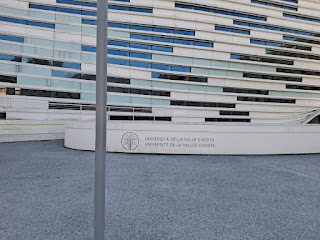This was a very important Conference regarding the hard times the world is living. We heard people that shared their experiences in many different war contexts (Jorge Burmeister-Petulá) and Palestine (Agnes Dudler); their projects of working "With families with traumatic experiences: evidence based trauma stabilisation programme (EBTS)" (Reijo Kaupillo); and the sharing of the Mona's Rakhawy "From sibling rivalry to wars: the role of group work and group psychotherapy". There were more than 120 participants. Thank you so much, Maurizio Gasseau and his team of the University of Aosta's Valey.
My own workshop was about: "Building Peace & conflict transformation: Galtung’s perspective".
Abstract:
Abstract:
Since 2008, when the crises of the financial systems emerged, tensions, conflicts and wars started to increase at all social levels until today. This situation is nurtured by political polarisations based on fake-news and hate discourses propagated through social media, promoting the increase of nationalisms and the extreme right-wing populist parties, the threatening of immigrants and minorities, all this associated with an unfair distribution of resources and in simultaneous with the climate changes.
In this workshop the proposal is to learn and to explore in a sociodramatic way, the methodology developed by John Galtung (1930-2024), the founder of “Peace Studies”. He developed a broaden social theory about violence and peace, authoring concepts as direct violence, negative peace (absence of direct violence), and positive peace, related with structural and cultural violence. Promoting positive peace considers the future, and the values associated, is built in the present, in the “here and now”, considering Human Rights, a better and more equitable distribution of resources, regarding the survival, the well-being, Freedom and a sustainable and promising relationship of each person with their environment, in which everyone can develop their best potential in a sustainable way for the common good of society. All these besides Social Justice, participation and Democracy. This approach challenges us to acknowledge conflicts, to transform them in a creative and non-violent way.
The morenian Sociodrama approach, from our point of view, can give a great contribution to conflict transformation through its technics like “future projection”, “social atom”, “role-plays”, “role-reversal”, “time-lines” and others, exploring the five phases proposed by Galtung (2008): (i) the identification and analysis of conflicts; (ii) the common aims to be achieved in the future; (iii) the critical reflection about both former phases; (iv) the plan for action, with several steps; and (v) the implementation of the plan.
We need to learn to live together by building common positive peaceful future scenarios. We need to understand better each other, to dream and to dialogue, to express ourselves, to act together and start by giving steps and more steps towards Peace – it’s an everyday work and a goal. Let’s give some steps together on this workshop towards Peace!
References:
Belchior, M. (2013). Aprender na Sociedade da Informação e do Conhecimento - entre o local e o global - contributos para a Educação para a Paz. Tese de Doutoramento, Instituto de Educação - Universidade de Lisboa. http://hdl.handle.net/10451/8005
Ercoşkun, B. (2021). On Galtung’s Approach to Peace Studies. Lectio Socialis, 5(I), 01–07. https://doi.org/10.47478/lectio.792847
Galtung, J. (2008). Form and Content of Peace Education. In M. Bajaj (Ed.), Encyclopedia of Peace Education. Information Age Publishing, pp. 49-58


.jpeg)
.jpeg)
.jpeg)
.jpeg)
.jpeg)
.jpeg)
.jpeg)
.jpeg)






.jpeg)
.jpeg)
.jpeg)
.jpeg)
.jpeg)